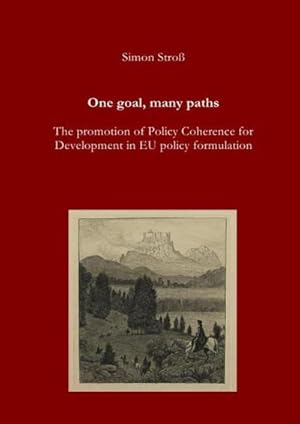simon stroß (1 Ergebnisse)
Produktart
- Alle Produktarten
- Bücher (1)
- Magazine & Zeitschriften
- Comics
- Noten
- Kunst, Grafik & Poster
- Fotografien
- Karten
-
Manuskripte &
Papierantiquitäten
Zustand
- Alle
- Neu
- Antiquarisch/Gebraucht
Einband
- alle Einbände
- Hardcover
- Softcover
Weitere Eigenschaften
- Erstausgabe
- Signiert
- Schutzumschlag
- Angebotsfoto
Land des Verkäufers
Verkäuferbewertung
-
One goal, many paths : The promotion of Policy Coherence for Development in EU policy formulation
Verlag: Epubli, 2014
ISBN 10: 3737505004ISBN 13: 9783737505000
Anbieter: AHA-BUCH GmbH, Einbeck, Deutschland
Buch
Taschenbuch. Zustand: Neu. Druck auf Anfrage Neuware - Printed after ordering - The European Union (EU) has committed itself to take account of objectives of development cooperation - such as poverty reduction - in policies which are likely to affect developing countries. This study investigates how and to what extent the EU promotes this aim for Policy Coherence for Development (PCD) in different governance areas.It focusses on the under-researched process dimension of PCD by analysing the degree to which opinions of development actors are systematically taken into account during EU policy formulation. The study follows a historical institutionalist approach that emphasises the independent role of institutions and their significance for policy output. Assessing the influence of formal and informal coherence procedures on policy development, the analytical framework examines how development actors use 'points of entry' to give input during day-to-day governance activities. It traces the planning process of six selected initiatives in three policy fields with PCD relevance: Fisheries, Environment, and Security.The study finds that the effectiveness in promoting PCD does not necessarily depend on the particular policy field and its competence category but more on the policy instrument used and especially on the EU institution which conducts the policy formulation. While the European Parliament and the new European External Action Service promote process PCD rather effectively, the picture for the European Commission is mixed and the EU member states refrain from dealing with the issue in the Council. The study concludes that increased abilities for development actors to give meaningful input especially in Commission policy-making and the expansion of inter-departmental coordination in all EU institutions would improve the EU's effectiveness in promoting PCD.


